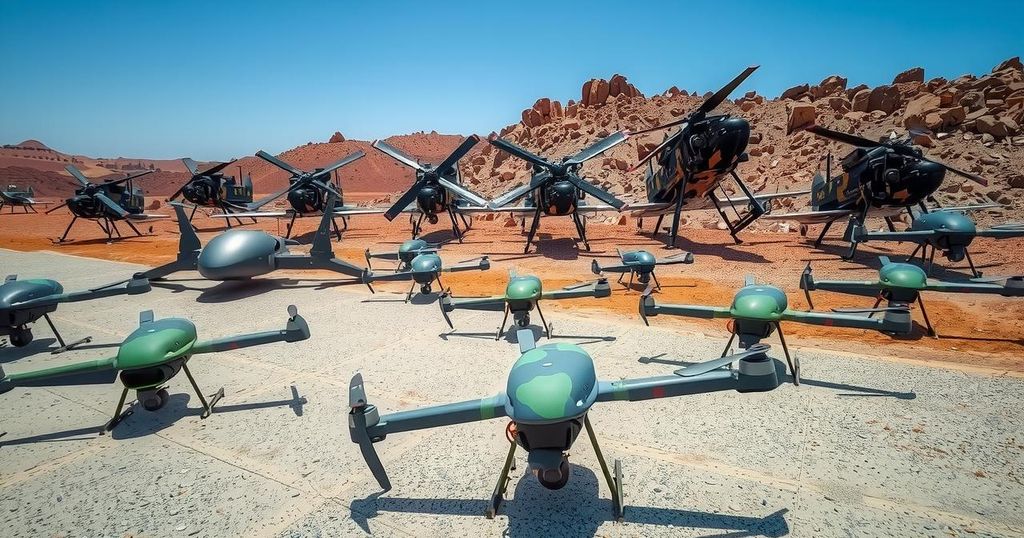North Korea’s Military Collaboration with Russia Intensifies Amid Conflict

North Korean leader Kim Jong Un has unveiled new military drones while sending 3,000 additional troops to Russia amid ongoing conflict in Ukraine. This follows an earlier deployment of 11,000 troops to assist Russia. The relationship between North Korea and Russia has grown closer since Russia’s invasion of Ukraine, raising concerns about military exchanges and North Korean troop performance in recent battles.
North Korean leader Kim Jong Un has showcased new military drones against the backdrop of rising tensions with Ukraine. Recent reports indicate that he has dispatched an additional 3,000 troops to assist Russia in its ongoing conflict in Ukraine. On March 27, Pyongyang released images of Kim inspecting reconnaissance and attack drone tests at an undisclosed location, raising international worries regarding Russia’s potential exchange of drone technology for military support from North Korea.
According to South Korea’s Yonhap news agency, the Joint Chiefs of Staff (JCS) have indicated that approximately 3,000 North Korean troops were sent to Russia in January and February, following an earlier deployment of 11,000 soldiers who have participated in operations in Russia’s Kursk region. Ukrainian analyst Oleh Saakyan emphasized, “We can say that Russia is already becoming dependent on North Korea in many ways…as well as in terms of soldiers.”
The additional troop dispatch was initially reported in late February but lacked detailed figures. Meanwhile, Russia’s Deputy Foreign Minister Andrei Rudenko has remarked that plans are underway for Kim’s visit to Moscow later this year. Kim has visited Moscow before, utilizing an armored train, for meetings with President Vladimir Putin in both 2019 and 2023. Since the beginning of Russia’s full-scale invasion of Ukraine in 2022, relations between Moscow and Pyongyang have significantly warmed.
Beyond troop support, North Korea has allegedly supplied short-range missiles, howitzers, and rocket launchers to Russia, noted South Korean military reports. Saakyan further observed, “In reality, the state of the Russian economy and Russia’s mobilization needs are becoming more and more difficult to meet, just like in Ukraine,” suggesting an increased reliance on North Korea for military resources.
The JCS has confirmed that this new troop deployment includes additional matériel and ammunition. This development arrives amid Russia’s demands for Western nations to cease military aid to Ukraine, which they have stipulated as a condition for a partial cease-fire. Just last month, Kim proclaimed his commitment to support Russia as part of a “comprehensive strategic partnership.”
The military collaboration with Russia began last autumn but faced challenges initially, with reports of high North Korean casualties due to Ukrainian drone attacks. A Ukrainian military intelligence official disclosed in January that many North Korean troops were rotated from the front lines due to significant losses. However, recent performance assessments suggest they have managed to push back Ukrainian forces in the Kursk region, causing concern in South Korea regarding their growing battlefield experience.
Moreover, North Korean state media reported on March 27 that Kim expressed satisfaction with the new drones, and announced plans to increase production as drones and artificial intelligence become priorities. South Korean military spokesperson Lee Sung Joon commented on the showcased drone’s components, suggesting it may contain parts sourced from Russia, but cautioned that North Korea could be overstating its capabilities, stating, “It looks quite cumbersome and we assess that it’s likely vulnerable to interception.”
In summary, the ongoing military collaboration between North Korea and Russia reflects a complex dynamic amidst the Ukraine conflict. North Korea’s recent military advancements, coupled with the deployment of thousands of troops to assist Russian forces, highlights a deepening strategic affiliation. Additionally, the potential for technology exchanges and the evolving military capabilities of North Korean troops introduces significant geopolitical implications that warrant close observation.
Original Source: www.rferl.org







